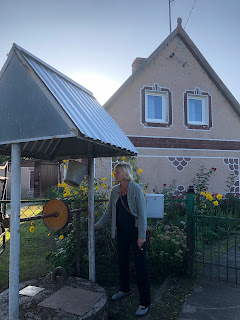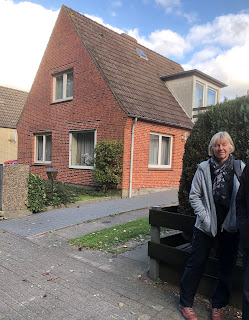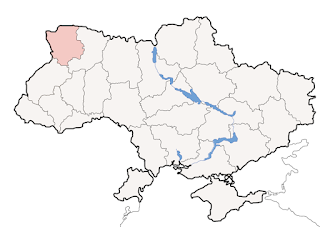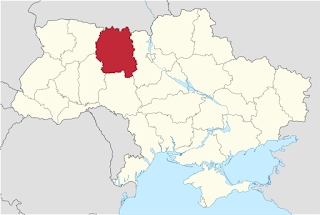 |
| House in the former Federofka , Ukraine (mom's home village) |
Perhaps it’s not surprising that the newcomers to Canada with whom I’ve been meeting are looking forwards not backwards. I know that my immigrant parents didn’t talk much about the war, about the Soviet prisons, about their homelessness. Instead they focused on working, on building homes, creating gardens and raising their children. They didn’t sit around and discuss why it took until 1945 for the war to end. They didn’t wonder if they could have found another evacuation route. They didn’t question what had happened to them. They just focused on the present... on creating a home.
Currently, I’ve been learning from recent Ukrainian arrivals. (Ha! They think they’re learning to improve their English, while truly, I’m re-learning what it means to escape from a war-torn country.) The women I’ve talked with don’t want to discuss politics. They don’t want to talk about the military strategies or about potential outcomes. They want stable jobs, a good education for their children and a decent apartment. Their native languages are Ukrainian or Russian. For them, languages are tools not political systems.
 |
Uncle's home in Slavskoye, now part
of Kaliningrad Oblast |
I’m rather surprised that in some cases I know more about their history than they do. I’m more surprised that they don’t really care. Like I said, they have more immediate concerns. All of this helps me realize how it was when my parents arrived here in the fifties and shelved the past into books and photo albums that became yellowed, dusty and
almost forgotten.
What will Ukraine be when the war ends? Many Ukrainians will be wounded or dead. Many will be citizens of another country. Whole cities have been destroyed. The students I work with have no home to return to. Their families and friends have all scattered throughout Europe and Canada—wherever they could find asylum.
When I cycled through my mother’s second home in East Prussia, I found just a divided land of ruins. The house her uncle built still stood, but the old man in it was from Kazakhstan. Friendly chap. Happy to have a house with a garden for his retirement. My mom’s first home in Volhynia, once a rich farmland dotted with wooden windmills and red brick churches, became a scattered collection of poverty-stricken hamlets with crushed people in crumbling shacks.
 |
| Next to father's home in Schleswig-Holstein |
I admire the energy, spirit and ambition of the Ukrainian people. They help me appreciate the good life I’ve been living here. Peace.
Here’s a quote I’ve often considered. Because war isn’t only about soldiers. War is about ordinary people. I hope it doesn’t offend anyone.
“Why of course the people don't want war. … But, after all, it is the leaders of the country who determine the policy and it is always a simple matter to drag the people along, whether it is a democracy, or a fascist dictatorship, or a parliament, or a communist dictatorship.
Voice or no voice, the people can always be brought to the bidding of the leaders. That is easy. All you have to do is tell them they are being attacked, and denounce the peacemakers for lack of patriotism and exposing the country to danger. It works the same in any country.”
― Hermann Goering
 |
| Parents' first home in Winnipeg |











